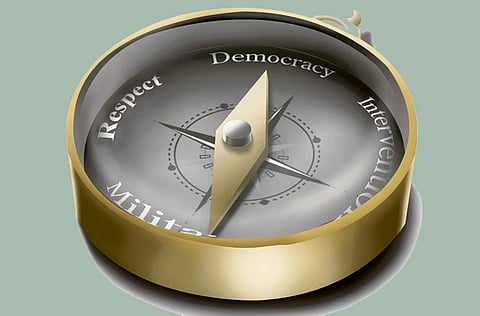Obama cannot let belligerent Iran hijack US foreign policy
Washington will do well to concentrate on Palestine, fighting poverty, and rebuilding its relationship with Islam

The Obama administration seems to have lost its moral compass, and has become entangled in the legacy of the Bush years. Rather than finding a new way forward for the world to manage its affairs in an inclusive and mutually respectful manner, Washington seems to have shifted to reacting to events without making any effort to offer a lead.
This is a waste. It is important that the world's largest democracy and one of the greatest bastions of individuals' rights should speak up and offer a vision of the values by which the world can be managed. And this vision should not be in a vacuum, as there are important issues which cannot be ignored like the ongoing clash between militant Islam and the international values shared by many mainstream Muslims, the huge danger of global warming, and the human tragedy of mass poverty in many parts of the world.
The US needs to offer a more consistent application of the values the president outlined, rather then seeking to manage each new crisis separately. When Barack Obama took over as president, he offered a new inclusive vision of what America's foreign policy was going to address.
He shook off the arrogance of George W. Bush's interventionism, and sought a new understanding with the many different peoples of the world, in which the US would treat them and their ideas with respect, while of course expecting the same respect to be returned.
But if this was happening, it would mean that greater importance would be placed on the deliberations at the United Nations, and a lot more significance would be given to the continuing international conference on global warming (like the latest meeting in Durban) and multilateral processes like the all important efforts to encourage free trade at the World Trade Organisation or the reform of the World Bank and International Monetary Fund.
Obama's important Cairo speech in June 2009 outlined a totally new approach, when he said he spoke to the Muslim world and said "so long as our relationship is defined by our differences, we will empower those who sow hatred rather than peace ... This cycle of suspicion and discord must end.
Broken promises
"I have come here to seek a new beginning between the US and Muslims around the world; one based upon mutual interest and mutual respect; and one based upon the truth that America and Islam are not exclusive, and need not be in competition. Instead, they overlap, and share common principles — principles of justice and progress; tolerance and the dignity of all human beings".
It is worth repeating Obama's words at length, since his administration has failed to deliver so much that he promised. These bright hopes of change have faded into a dismal continuation of what American administrations have done for decades.
But the world needs more as poverty and mass unemployment remain serious issues, particularly in the Arab world where supporting development and education has to be at the top of any relationship.
Without young people getting both economic hope and training offering them the ability to think for themselves and improve their lot in life, most of the more short-term political work will fail.
That said, America's largest political failure is Obama's refusal to curb Netanyahu's dangerous and radical government in Israel, nor to offer any practical display of American disapproval of its continuing disdain for any peace talks with the Palestinians, and the continuing travesty of continuing building in the West Bank colonies. Even the horrific Israeli assault on Gaza in January 2009 passed off without any penalty from Washington.
This failure to act against Israeli policies is the worst example of Obama's administration permitting Washington to continue business as usual. The occupation of Palestine remains a key determinant on how Muslims and Arabs perceive the intentions of the US administration, and it has failed this test.
The other important test was how Washington responded to the Arab Spring. This was a mixed bag: in Tunisia the response was quick and effective, although that was helped by the quick resolution of the revolution.
In Egypt, the initial support for Hosni Mubarak turned quickly to support for change, and probable quiet American orders to the Egyptian military to remain in the barracks helped the protests gain traction. In Libya, the US backed the controversial Nato intervention on the side of the rebels against Muammar Gaddafi, which helped that revolution come to a clear political end.
This is in stark contrast to Iraq, where US troops have finally left; and Afghanistan where US troops are still fighting after nine years on a mandate which is supposed to run out in 2014, although the general in charge is now talking of seeking a new mechanism which would allow US troops to be in Afghanistan up to at least 2020. These long-term military expeditions are doomed to failure since they lack a clear political purpose.
It is frightening that American policy in the Middle East during 2012 is likely to be dominated by Iran. Obama's great challenge will be to avoid letting President Mahmoud Ahmadinejad hijack US foreign policy into the confrontation he desperately craves, and to concentrate on much more important issues, like the future of Palestine, fighting poverty and economic despair, and rebuilding the international world's relationship with Islam.


